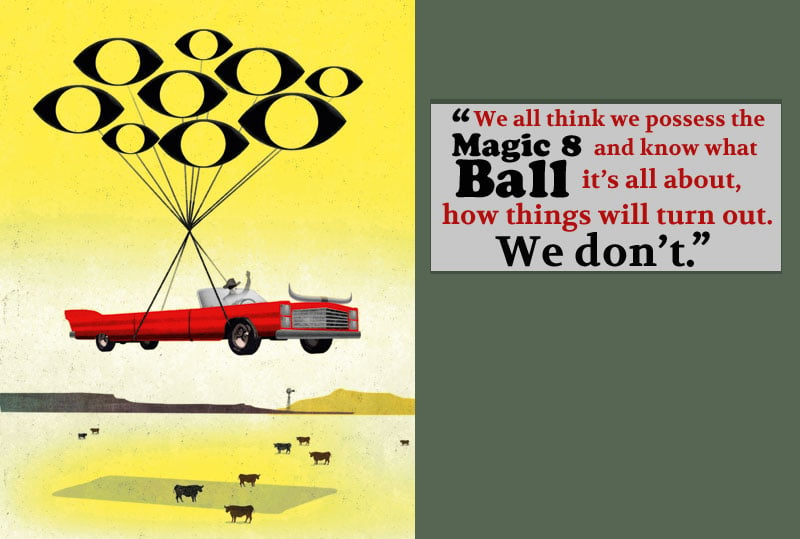
The Next 60: Where Are My Flying Cars?

A version of this story ran in the December 2014 issue.
Above: Joe Lansdale on the future
Editor’s note: This essay is part of our 60th anniversary issue, which can be viewed in full here.
Predicting the future has its problems. We all try to do it, even if just to plan for the following day, but when you really get right down to it, life and people mess things up when it comes to predictions.
An example. So you’re driving to the mall and have definite plans about what your day is going to be like, going to lunch, then a movie, and you arrive, and some knothead who thinks the louder he plays his stereo the cooler he is races ahead of you and into your prime parking spot. If you predicted a relaxed and restful day, you have already had that day altered, if only slightly, by a jerk with a fast car and a loud stereo.
Give it a few minutes and you can get over this annoyance. You might even find a better parking place and carry on with your plans, envisioning how smoothly they will proceed from that point on, only to find that the same jerk who got your parking spot just got the last table for one at your favorite restaurant and will show up in the line ahead of you at the theater, too. If you’re really unlucky he will sit by you, talk and text on his cell phone, and prove to be legally armed, ready to shoot you if you ask him to turn off his phone, as he’s already laid out a game plan for claiming he had to Stand His Ground.
Not being able to predict the future doesn’t stop us from trying. We all think we possess the Magic 8 Ball and know what it’s all about, how things will turn out.
We don’t. Remember when Ronald Reagan in the 1960s made a long-playing record that railed against Medicare and how it was the end of civilization as we knew it, or words to that effect? He was certain that Medicare was going to lead to America becoming a socialist state with goose-stepping soldiers and bread lines. Reagan’s party would in the future choose to defend this socialist program, and the same conservatives who originally thought it was the beginning of the end of the world would scream for the government to get its hands off their Medicare. Somewhere in there, these former opponents of Medicare had forgotten it was a government program at all, or that they had once objected to the tit they were now greedily sucking.
This is only one example of predictions gone awry. I once asked my grandmother, as she tipped into her 90s, if she had envisioned a future akin to the one we now live in.
Her name was Ole and she was born in the 1880s, and as a child she had seen Buffalo Bill’s Wild West Show. She could still describe to me how Buffalo Bill looked and what he was wearing, and if I had pressed she might well have remembered what she was wearing that day, right down to the drawers. She was sharp as the proverbial tack and lived to be nearly 100 years old, so she had seen a lot of changes from the 19th century to the 20th, and she seemed to remember them all.
Her answer to my question was that she thought maybe we would eventually be able to fly over the ocean a little quicker, and surely we would get better false teeth, but the idea that astronauts would circle the earth, land on the moon, and come back was something she never dreamed of. Nor had she envisioned computers, which at that time were large rectangles with spinning reels, festooned with blinking lights. Machines as quaint now as the rotary phone. She was still amazed at electricity and inside toilets that flush, but on the whole she was with the program.
Ole wasn’t one to carry on about the good old days. She thought they were pretty skunky. What she remembered were hard times, lowering buckets into wells, using outdoor toilets frequently occupied by spiders or snakes, and having to eat pretty much anything that didn’t eat her.
It’s not all cool medical breakthroughs and the ability to pause live TV. Technology has left us with far less privacy. I can see my house on the Internet, photographed and charted by satellites. And I can see yours, too.
These days I myself am suffering a bit of what Alvin Toffler called “future shock.” It seems each week brings another advancement in technology I’m not smart enough to use or understand.
I should have been better prepared for my future, as I am a reader of science fiction. I have heard people talk about how poorly science fiction writers predict the future, but I’ve got to say I think those folks are all wet. The writers did a pretty good job, even if the job was less about prediction and more about telling an interesting story.
OK, no space aliens have arrived, and we don’t have flying cars yet, but Philip K. Dick, for example, known as a hack when I was a kid, has become something of a literary philosopher and sage since his death in 1982. The worlds he wrote about have gradually developed into a sometimes-disturbing reality. His future is our present. Microwaves, cell phones, miniature computers that can do more than those oversized rectangles with reels and lights ever could, even the use of “creds,” or credit cards, have become as common today as the hula hoop and the Slinky of my childhood.
But it’s not all cool medical breakthroughs and the ability to pause live TV. Technology has left us with far less privacy. I can see my house on the Internet, photographed and charted by satellites. And I can see yours, too. The most banal goings-on have acquired a special life on Twitter. Our every act is recorded as if for posterity, even if it’s merely to post that we’re eating a rather large burrito.
As for my own predictions, they are less about jumps in technology than about social changes. They are broader than Texas. They are long overdue, and I’m not predicting so much as observing the obvious. They are already on the fast train toward acceptance, though it took some time for the engine to heat up and start rolling. Still, it’s not a clear run. There are bandits stacking branches and boulders on the tracks, ready to derail the train and steal everything from the passengers but their innermost thoughts. And who knows, that might be next.
Racial issues were huge when I was a child, and they were ugly. The worst part was that most of the people I knew didn’t even know there was an issue. They thought there were white people and everyone else, and when everyone else had been born god had justly given them back seats on life’s bus, with loose springs under their asses. The whites got plush seats and box lunches with a ham sandwich, chips and a mixed drink. Everyone else got a turd to pick corn kernels out of. This was usually justified religiously by saying it was in the Bible, and there was generally some reference to Noah’s son seeing Noah without his drawers on, and therefore the son’s entire line of descendants were given the “wrong” color and short shrift. I say Noah should have kept his pants on.
Not being able to predict the future doesn’t stop us from trying. We all think we possess to Magic 8 Ball.
Those days of racial hatred as a part of our day-to-day being are finally fading, though I hasten to add, before you say it’s all a level playing field now, that you might want to have an honest discussion with someone of color who deals with that playing field on a daily basis and still feels it wobble beneath their feet.
It’s different for gays now as well, and certainly better. In the past they were known by less pleasant names and were suspected of waiting outside restrooms to grab any heterosexual they saw, push them down onto a urine-stained floor, and force them into “unnatural” acts that might even involve a chipmunk or a gopher.
Now we know that terrible people are that way not because of color or sexual orientation, but simply because some people of all spots and stripes are assholes. It’s a hard thing to discover that your youthful ideals about humankind have holes in them, and it’s going to be a little more difficult to make a better world than we expected when our minds were fresh and our hearts were lighter. Give peace a chance and loan your tools isn’t quite going to do it.
But I do predict that on matters of race and sexual orientation, things are going to get better, and not just in Texas, though we have to face the fact that we’re lagging a little more in those areas than some other places. Humankind will always be greedy and self-centered, for the most part, and we don’t seem to be the best at learning from experience. A monkey is much better. But we have to hope that now and again we can make a bit of progress.
Listen to me, being all optimistic.
So, what can I predict for Texas in the future?
A lot more concrete. All that ice north and south will melt, drowning polar bears, penguins and research scientists. Giant sharks will grow legs and come onto land in search of food.
Nah. Just kidding about the sharks.
The only thing I can honestly predict is that the sun will rise and the sun will set, and in the far future it will wink out, and so will we. Even though we’re talking billions of years, I find that a little sad. But before that happens, I do hope that someone will have invented a flying car with bucket seats and drink holders.



